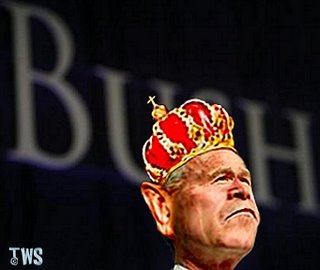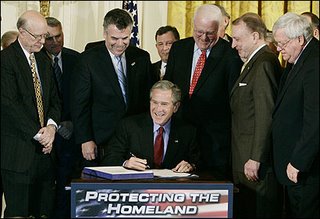Above The Law

"The Royal Thug," (c) The Worried Shrimp

Bush smiling happily as he signs legislation he has no intention of observing, the Boston Globe
Little do those legislators know that, after the lights, cameras & made-for-complacent-media photo-ops go back from whence they came, Bush puts his "Constitutional legal scholar" hat on & rewrites the laws he just signed by issuing "signing statements" that warn he will interpret the laws as he wishes. Or they can pretend not to know, but by now they all do.
The "signing statements" also serve as directives to the federal agencies concerned as to how to go about their business.
Don't look to the Supreme Court to put a stop to it, because it's an old saw of neocon legal thought, hatched in the infancy of that movement, & a very shitty disingenuous way of appearing to agree with legislation while privately doing an end-run around it. Bearing in mind that in those dark days of the nascent neo-con movement, none of its members really thought they'd succeed at capturing the White House as well as both Houses of Congress, so they came up with this truly arrogant legal theory which avoids having a meaningful public debate, & completely undermines everything we thought democracy should be.
Trust us, we know better than you how you want us to run your lives.
Both Justices Scalia & the newbie Alito ascribe to it, so don't look there to have the practice ousted. (Another way Democrats completely blew it when they could have kept Alito off the Supreme Court--they were sleeping on the job).
Look to Congress to fix it.
As the Boston Globe reported April 30:
"WASHINGTON -- President Bush has quietly claimed the authority to disobey more than 750 laws enacted since he took office, asserting that he has the power to set aside any statute passed by Congress when it conflicts with his interpretation of the Constitution.
"Among the laws Bush said he can ignore are military rules and regulations, affirmative-action provisions, requirements that Congress be told about immigration services problems, ''whistle-blower" protections for nuclear regulatory officials, and safeguards against political interference in federally funded research.
"Legal scholars say the scope and aggression of Bush's assertions that he can bypass laws represent a concerted effort to expand his power at the expense of Congress, upsetting the balance between the branches of government. The Constitution is clear in assigning to Congress the power to write the laws and to the president a duty ''to take care that the laws be faithfully executed." Bush, however, has repeatedly declared that he does not need to ''execute" a law he believes is unconstitutional.
"Former administration officials contend that just because Bush reserves the right to disobey a law does not mean he is not enforcing it: In many cases, he is simply asserting his belief that a certain requirement encroaches on presidential power.
"But with the disclosure of Bush's domestic spying program, in which he ignored a law requiring warrants to tap the phones of Americans, many legal specialists say Bush is hardly reluctant to bypass laws he believes he has the constitutional authority to override.
"Far more than any predecessor, Bush has been aggressive about declaring his right to ignore vast swaths of laws -- many of which he says infringe on power he believes the Constitution assigns to him alone as the head of the executive branch or the commander in chief of the military.
"Many legal scholars say they believe that Bush's theory about his own powers goes too far and that he is seizing for himself some of the law-making role of Congress and the Constitution-interpreting role of the courts.
"Phillip Cooper, a Portland State University law professor who has studied the executive power claims Bush made during his first term, said Bush and his legal team have spent the past five years quietly working to concentrate ever more governmental power into the White House.
'There is no question that this administration has been involved in a very carefully thought-out, systematic process of expanding presidential power at the expense of the other branches of government," Cooper said. ''This is really big, very expansive, and very significant."
"For the first five years of Bush's presidency, his legal claims attracted little attention in Congress or the media. Then, twice in recent months, Bush drew scrutiny after challenging new laws: a torture ban and a requirement that he give detailed reports to Congress about how he is using the Patriot Act.
"Bush administration spokesmen declined to make White House or Justice Department attorneys available to discuss any of Bush's challenges to the laws he has signed.
"Instead, they referred a Globe reporter to their response to questions about Bush's position that he could ignore provisions of the Patriot Act. They said at the time that Bush was following a practice that has ''been used for several administrations" and that ''the president will faithfully execute the law in a manner that is consistent with the Constitution."
"But the words 'in a manner that is consistent with the Constitution" are the catch, legal scholars say, because Bush is according himself the ultimate interpretation of the Constitution. And he is quietly exercising that authority to a degree that is unprecedented in US history.
"Bush is the first president in modern history who has never vetoed a bill, giving Congress no chance to override his judgments. Instead, he has signed every bill that reached his desk, often inviting the legislation's sponsors to signing ceremonies at which he lavishes praise upon their work.
"Then, after the media and the lawmakers have left the White House, Bush quietly files 'signing statements" -- official documents in which a president lays out his legal interpretation of a bill for the federal bureaucracy to follow when implementing the new law. The statements are recorded in the federal register.
"In his signing statements, Bush has repeatedly asserted that the Constitution gives him the right to ignore numerous sections of the bills -- sometimes including provisions that were the subject of negotiations with Congress in order to get lawmakers to pass the bill. He has appended such statements to more than one of every 10 bills he has signed.
"'He agrees to a compromise with members of Congress, and all of them are there for a public bill-signing ceremony, but then he takes back those compromises -- and more often than not, without the Congress or the press or the public knowing what has happened," said Christopher Kelley, a Miami University of Ohio political science professor who studies executive power."
The Globe article is lengthy--7 pages--but highly recommended reading.
And if you're wondering, like me, since when did America become an autocracy, you might just want to share it with your friends, too.
We must overcome the apathy.

1 Comments:
Apathy...what's that?
Post a Comment
<< Home